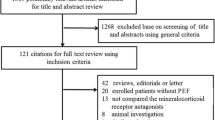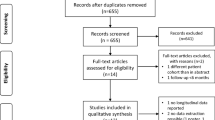Abstract
Background
Sudden cardiac death (SCD) is an important cause of death in patients with left-ventricular systolic dysfunction (LVSD). Mineralocorticoid receptor antagonists (MRAs) may attenuate this risk. We aimed to assess the impact of MRAs on SCD in patients with LVSD.
Methods
A fixed-effect meta-analysis at individual patient-level was performed using 11,032 patients recruited in three placebo-controlled randomized trials: Randomized Aldactone Evaluation Study (RALES), Eplerenone Post Acute Myocardial Infarction Heart Failure Efficacy and Survival Study (EPHESUS), and Eplerenone in Mild Patients Hospitalization and Survival Study in Heart Failure (EMPHASIS-HF). Treatment effect was determined using a Cox proportional hazards model stratified by study.
Results
Patients receiving MRAs were at lower risk of SCD compared with placebo-treated patients after a mean follow-up of 18 months (HR 0.77, 95% CI 0.66–0.89). This effect was consistent across trials and did not change substantially after adjustment for 14 baseline co-variates. Moreover, the benefits of MRAs were consistent across study subgroups, except for a greater effect in those < 65 years old and those using beta-blockers. Using stratified analyses, we also found a consistent effect in relevant subsets of patient defined by heart failure cause, NYHA class or LVEF ≤ 35%.
Conclusions
MRAs reduce the risk for SCD by 23% in patients with heart failure and LVSD. In these patients, the use of MRAs, on top of other evidence-based medications, should be optimized. It might be useful to re-assess the benefit of implantable cardiac defibrillator (ICD) placement, as ICD treatment effect was evaluated in trials enrolling patients not receiving MRAs.



Similar content being viewed by others
References
MERIT-HF-Investigators (1999) Effect of metoprolol CR/XL in chronic heart failure: metoprolol CR/XL randomised intervention trial in congestive heart failure (MERIT-HF). Lancet 353:2001–2007
Domanski MJ, Exner DV, Borkowf CB et al (1999) Effect of angiotensin converting enzyme inhibition on sudden cardiac death in patients following acute myocardial infarction. A meta-analysis of randomized clinical trials. J Am Coll Cardiol 33:598–604
Desai AS, McMurray JJV, Packer M et al (2015) Effect of the angiotensin-receptor-neprilysin inhibitor LCZ696 compared with enalapril on mode of death in heart failure patients. Eur Heart J 36:1990–1997. https://doi.org/10.1093/eurheartj/ehv186
Shen L, Jhund PS, Petrie MC et al (2017) Declining risk of sudden death in heart failure. N Engl J Med 377:41–51. https://doi.org/10.1056/NEJMoa1609758
Køber L, Thune JJ, Nielsen JC et al (2016) Defibrillator implantation in patients with nonischemic systolic heart failure. N Engl J Med 375:1221–1230. https://doi.org/10.1056/NEJMoa1608029
Ponikowski P, Voors AA, Anker SD et al (2016) 2016 ESC Guidelines for the diagnosis and treatment of acute and chronic heart failure: The Task Force for the diagnosis and treatment of acute and chronic heart failure of the European Society of Cardiology (ESC) developed with the special contribution of the Heart Failure Association (HFA) of the ESC. Eur Heart J 37:2129–2200. https://doi.org/10.1093/eurheartj/ehw128
Yancy CW, Jessup M, Bozkurt B et al (2013) 2013 ACCF/AHA guideline for the management of heart failure: a report of the American College of Cardiology Foundation/American Heart Association Task Force on Practice Guidelines. J Am Coll Cardiol 62:e147–e239. https://doi.org/10.1016/j.jacc.2013.05.019
Pitt B, Zannad F, Remme WJ et al (1999) The effect of spironolactone on morbidity and mortality in patients with severe heart failure. Randomized Aldactone Evaluation Study Investigators. N Engl J Med 341:709–717. https://doi.org/10.1056/NEJM199909023411001
Zannad F, McMurray JJV, Krum H et al (2011) Eplerenone in patients with systolic heart failure and mild symptoms. N Engl J Med 364:11–21. https://doi.org/10.1056/NEJMoa1009492
Pitt B, Remme W, Zannad F et al (2003) Eplerenone, a selective aldosterone blocker, in patients with left ventricular dysfunction after myocardial infarction. N Engl J Med 348:1309–1321. https://doi.org/10.1056/NEJMoa030207
Bossard M, Binbraik Y, Beygui F et al (2018) Mineralocorticoid receptor antagonists in patients with acute myocardial infarction—a systematic review and meta-analysis of randomized trials. Am Heart J 195:60–69. https://doi.org/10.1016/j.ahj.2017.09.010
Guglin M, Awad KE, Polavaram L, Vankayala H (2007) Aldosterone antagonists: the most underutilized class of heart failure medications. Am J Cardiovasc Drugs 7:75–79
Bistola V, Simitsis P, Farmakis D et al (2018) Association of mineralocorticoid receptor antagonist use and in-hospital outcomes in patients with acute heart failure. Clin Res Cardiol 107:76–86. https://doi.org/10.1007/s00392-017-1161-7
Perrier E, Kerfant B-G, Lalevee N et al (2004) Mineralocorticoid receptor antagonism prevents the electrical remodeling that precedes cellular hypertrophy after myocardial infarction. Circulation 110:776–783. https://doi.org/10.1161/01.CIR.0000138973.55605.38
Pitt B (1995) “Escape” of aldosterone production in patients with left ventricular dysfunction treated with an angiotensin converting enzyme inhibitor: implications for therapy. Cardiovasc drugs Ther 9:145–149
Ouvrard-Pascaud A, Sainte-Marie Y, Bénitah J-P et al (2005) Conditional mineralocorticoid receptor expression in the heart leads to life-threatening arrhythmias. Circulation 111:3025–3033. https://doi.org/10.1161/CIRCULATIONAHA.104.503706
Bapoje SR, Bahia A, Hokanson JE et al (2013) Effects of mineralocorticoid receptor antagonists on the risk of sudden cardiac death in patients with left ventricular systolic dysfunction: a meta-analysis of randomized controlled trials. Circ Heart Fail 6:166–173. https://doi.org/10.1161/CIRCHEARTFAILURE.112.000003
da Costa BR, Jüni P (2014) Systematic reviews and meta-analyses of randomized trials: principles and pitfalls. Eur Heart J 41:3336–3345. https://doi.org/10.1093/eurheartj/ehu424
Riley RD, Lambert PC, Abo-Zaid G (2010) Meta-analysis of individual participant data: rationale, conduct, and reporting. BMJ 340:c221
Rossignol P, Girerd N, Bakris G et al (2017) Impact of eplerenone on cardiovascular outcomes in heart failure patients with hypokalaemia. Eur J Heart Fail 19:792–799. https://doi.org/10.1002/ejhf.688
Solomon SD, Zelenkofske S, McMurray JJV et al (2005) Sudden death in patients with myocardial infarction and left ventricular dysfunction, heart failure, or both. N Engl J Med 352:2581–2588. https://doi.org/10.1056/NEJMoa043938
Le H-H, El-Khatib C, Mombled M et al (2016) Impact of aldosterone antagonists on sudden cardiac death prevention in heart failure and post-myocardial infarction patients: a systematic review and meta-analysis of randomized controlled trials. PLoS One 11:e0145958. https://doi.org/10.1371/journal.pone.0145958
Bardy GH, Lee KL, Mark DB et al (2005) Amiodarone or an implantable cardioverter–defibrillator for congestive heart failure. N Engl J Med 352:225–237. https://doi.org/10.1056/NEJMoa043399
McMurray JJV, Krum H, Abraham WT et al (2016) Aliskiren, enalapril, or aliskiren and enalapril in heart failure. N Engl J Med 374:1521–1532. https://doi.org/10.1056/NEJMoa1514859
Miller AL, Wang Y, Curtis J et al (2012) Optimal medical therapy use among patients receiving implantable cardioverter/defibrillators: insights from the National Cardiovascular Data Registry. Arch Intern Med 172:64–67. https://doi.org/10.1001/archinternmed.2011.466
Fonarow GC, Yancy CW, Hernandez AF et al (2011) Potential impact of optimal implementation of evidence-based heart failure therapies on mortality. Am Heart J 161:1024–1030. https://doi.org/10.1016/j.ahj.2011.01.027
Sanders GD, Hlatky MA, Owens DK (2005) Cost-effectiveness of implantable cardioverter–defibrillators. N Engl J Med 353:1471–1480. https://doi.org/10.1056/NEJMsa051989
Moss AJ, Zareba W, Hall WJ et al (2002) Prophylactic implantation of a defibrillator in patients with myocardial infarction and reduced ejection fraction. N Engl J Med 346:877–883. https://doi.org/10.1056/NEJMoa013474
Stanek EJ, Oates MB, McGhan WF et al (2000) Preferences for treatment outcomes in patients with heart failure: symptoms versus survival. J Card Fail 6:225–232. https://doi.org/10.1054/jcaf.2000.9503
Stambler BS, Laurita KR, Shroff SC et al (2009) Aldosterone blockade attenuates development of an electrophysiological substrate associated with ventricular tachyarrhythmias in heart failure. Heart Rhythm 6:776–783. https://doi.org/10.1016/j.hrthm.2009.02.005
Ferreira JP, Girerd N, Medeiros PB et al (2016) Spot urine sodium excretion as prognostic marker in acutely decompensated heart failure: the spironolactone effect. Clin Res Cardiol 105:489–507. https://doi.org/10.1007/s00392-015-0945-x
Cooper HA, Dries DL, Davis CE et al (1999) Diuretics and risk of arrhythmic death in patients with left ventricular dysfunction. Circulation 100:1311–1315
Aldahl M, Jensen A-SC, Davidsen L et al (2017) Associations of serum potassium levels with mortality in chronic heart failure patients. Eur Heart J 38:2890–2896. https://doi.org/10.1093/eurheartj/ehx460
Vukadinović D, Lavall D, Vukadinović AN et al (2017) True rate of mineralocorticoid receptor antagonists-related hyperkalemia in placebo-controlled trials: a meta-analysis. Am Heart J 188:99–108. https://doi.org/10.1016/j.ahj.2017.03.011
Wei L, Struthers AD, Fahey T et al (2010) Spironolactone use and renal toxicity: population based longitudinal analysis. BMJ 340:c1768–c1768. https://doi.org/10.1136/bmj.c1768
Weir MR, Bakris GL, Bushinsky DA et al (2015) Patiromer in patients with kidney disease and hyperkalemia receiving RAAS inhibitors. N Engl J Med 372:211–221. https://doi.org/10.1056/NEJMoa1410853
Iqbal J, Parviz Y, Pitt B et al (2014) Selection of a mineralocorticoid receptor antagonist for patients with hypertension or heart failure. Eur J Heart Fail 16:143–150. https://doi.org/10.1111/ejhf.31
Funding
Dr Rossello has received support from SEC-CNIC CARDIOJOVEN Program.
Author information
Authors and Affiliations
Corresponding author
Ethics declarations
Conflict of interest
XR, CA, SJP, and DJVV have nothing to declare. JMcM reports conflicts of interest from Roche Pharmaceuticals, during the conduct of the study; other from Novartis, Cardiorentis, Amgen Oxford University/Bayer, GlaxoSmithKline, Theracos, Abbvie, DalCor, Pfizer, Merck, AstraZeneca Bristol Myers Squibb (BMS), Kidney Research UK (KRUK)/Kings College Hospital, London/Vifor-Fresenius Pharma, outside the submitted work. BP reports personal fees from Bayer, personal fees from KDP pharmaceuticals, and personal fees from Astrazeneca, outside the submitted work; In addition, BP has a patent site-specific delivery of eplerenone to the myocardium pending to university of Michigan. Faiez Zannad received honoraria and/or travel fees for participation in clinical trial committees and meetings/presentations from Amgen, AstraZeneca, Bayer, Boehringer, Boston Scientific, GE Healthcare, CVRx, Relypsa/Vifor-Fresenius, J&J, Pfizer, Novartis, Quantum Genomics, Resmed, Takeda, and received honoraria and/or travel fees for participation in advisory boards from BMS, KBP BioSciences, Livanova, NovoNordisk, Roche, ZS Pharma.
Electronic supplementary material
Below is the link to the electronic supplementary material.
Rights and permissions
About this article
Cite this article
Rossello, X., Ariti, C., Pocock, S.J. et al. Impact of mineralocorticoid receptor antagonists on the risk of sudden cardiac death in patients with heart failure and left-ventricular systolic dysfunction: an individual patient-level meta-analysis of three randomized-controlled trials. Clin Res Cardiol 108, 477–486 (2019). https://doi.org/10.1007/s00392-018-1378-0
Received:
Accepted:
Published:
Issue Date:
DOI: https://doi.org/10.1007/s00392-018-1378-0




